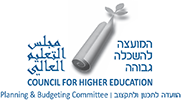About Leaders in Academia
The Edmond de Rothschild Foundation, the Edmond de Rothschild Partnerships, and the Council for Higher Education joined forces in “Leaders in Academia”: A unique new program to train a reserve of academic leaders.
The program prepares high-ranking officials from Israel’s higher education institutions to take on leadership roles and become catalysts for change in all aspects of academic and administrative management.
The program’s overarching vision is to cultivate a group of influential “change agents” from all of Israel’s academic institutions, who will work to promote an exemplary, dynamic, and forward-thinking educational system for the benefit of research, students, and the economy in general.
About 30 male and female colleagues will take part every year in shaping the learning community. This community will be based on academic staff and managers currently staffing or expected to staff key positions in the future and will include deans and principals of schools in the academic system, and senior department managers and vice presidents in the administrative system. The program is demanding, intensive and extensive, and includes approximately 20 days of learning in Israel, a learning journey abroad, as well as taking part in work processes, thinking and development between meetings.
Goal
Israel’s higher education system is managed by senior academics whose primary focus is on research and teaching. Management and leadership roles have not been central to academic career advancement and, in many cases, have been perceived as hindrances to academic progress. Furthermore, the skills and knowledge acquired through academic pursuits do not necessarily prepare individuals for leadership positions, especially ones that require navigating the complex changes and challenges of the contemporary global and local landscape. This situation—which may have sufficed in the formerly stable academic landscape—requires adaptations to the dynamic local and global reality.
To adapt to this evolving reality, there is a need for a new approach to leadership – one that integrates academic and administrative aspects, fostering diverse perspectives and skill sets.
We believe that initiating a network of both current and future senior leaders, nurturing it, and providing ongoing support for it, can give rise to a systematic process of bridging the existing gap, both at the institutional and national levels.
אין הודעות חדשות





